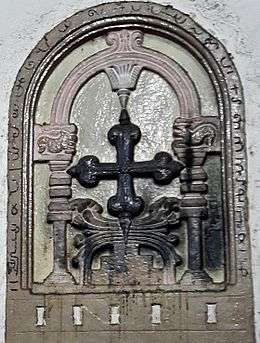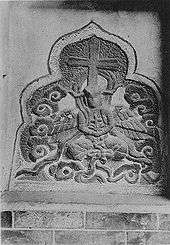Anuradhapura cross

The Cross of Anuradhapura or Anuradhapura cross is a form of the Christian cross symbol. It is the most ancient symbol of Christianity in Sri Lanka.[1][2][3]
The cross
The cross was discovered in 1912 during archaeological excavations in Anuradhapura.[4] It is cut in sunk relief on the side of a smooth granite column of which a fragment was excavated. An immediate determination about the cross came from the Archaeological Commissioner of Ceylon, Edward R. Ayrton, who concluded that it was a Portuguese cross. In 1924, Ayrton's successor, Arthur Maurice Hocart, put more effort to clarify the cross and he described it in his publication, Memoirs of the Archaeological Survey of Ceylon, as being "a cross of a floret type standing on a stepped pedestal from which emanates two fronds on each side of the cross like horns".[4] Hocart also concluded it was a Portuguese cross.[1][4] Both men considered that it was a Nestorian cross or "Persian Cross" from the Portuguese era. A number of historical records also suggest that Assyrian Church of the East may have been in Sri Lanka between the middle fifth and sixth centuries.[5][6][7] There, it is believed that the cross was dated to the Anuradhapura period.[8] Meanwhile, whilst it was considered as a Portuguese cross these claims are questionable given various historic facts, notably that the Portuguese did not have a presence in Anuradhapura at the time.[1]
The most conclusive determination of the cross's origins was made in 1926 by Humphrey Codrington, based on evidence contained in a 6th-century manuscript, Christian Topography, that a community of Persian Christians were known to reside in Taprobanê (the Ancient Greek name for Sri Lanka). Codrington wrote in his book, A Short History of Ceylon, that "about A.D. 500 we read of a Persian colony; a Nestorian cross undoubtedly belonging to this community is to be seen in the Anuradhapura museum".[9][10] In 1954 the then assistant Archaeological Commissioner, Titus Devendra, dismissed the historical reliability of the Christian Topography and attributed the cross to the Portuguese dating it later than 1547.[11] Academics however have since concluded that the Christian Topography is historically accurate.[12] In 1984 an archaeological find at Manthai confirmed the existence of Persian Christians in Sri Lanka, including a seal with a Nestorian cross, with similar stylistic features to the Anuradhapura cross.[13]
Symbology
The cross is considered as a variation of the St Thomas Cross[nb 1] due to its similar shape and possible links between the early Christian community in South India and Sri Lanka. The Anuradhapura cross however has unique features when compared to other crosses.[2] The three main elements that the Anuradhapura cross has in common with Nestorian crosses are: the "leaves" (with their upward facing fronds) at the base of the cross, which symbolize the "tree of life" (the vitality of the tree is accentuated by its fruit-like protrusions); the second element is that each of the arms of the cross terminate in a pearl. Pearls played a central theme in Syriac devotional literature and iconography. The third element is the base, which is a three-stepped pedestal. The three tiers symbolise the three levels of paradise, the three decks of the ark, and the three limits of ascent to Sinai.[15]
Popular use
The Anuradhapura cross was featured in the official logo of Pope Francis' visit to Sri Lanka.[16] The website of Archdiocese of Colombo mentions the cross as the Glorious Cross or the Cross of the Resurrection. The Diocese of Kurunegala (Church of Ceylon) has the cross on its emblem.[17]
Similar crosses
-

Persian cross/St. Thomas Christian cross (Kerala, India)
-

Syrian/Jacobite cross (illustration)
-
Nestorian cross (China), with flora at the bottom
-

Nestorian cross (China), on a headstone
-

Portuguese cross (founded in 1146)
-

Portuguese cross (founded in 1319)
Note
References
- 1 2 3 Oswald Gomis, Emiretus (22 April 2011). "The Cross of Anuradhapura". Daily News. Retrieved 27 February 2015.
- 1 2 Pinto, Leonard (20 September 2013). "A Brief History Of Christianity In Sri Lanka". Colombo Telegraph. Retrieved 27 February 2015.
- ↑ Antony, Thomas. "Analogical review on Saint Thomas Cross- The symbol of Nasranis-Interpretation of the Inscriptions". Nasrani Syrian Christians Network. Retrieved 27 February 2015.
- 1 2 3 A. M. Hocart (Ed) (1924). The Ratana Pãsãda, the Western Monasteries of Anuradhapura, Excavations in the Citadel, The so-called Tomb of King Duttagamani, Privy Stones. Archeological Department (Ceylon). p. 51–52. ISBN 978-8-12-061093-4.
- ↑ "Mar Aprem Metropolitan Visits Ancient Anuradhapura Cross in Official Trip to Sri Lanka". Assyrian Church News. 6 August 2013. Retrieved 27 February 2015.
- ↑ Weerakoon, Rajitha (26 June 2011). "Did Christianity exist in ancient Sri Lanka?". The Sunday Times. Retrieved 28 February 2015.
- ↑ "Main interest". Daily News. 22 April 2011. Retrieved 27 February 2015 – via HighBeam Research. (subscription required (help)).
- ↑ "Pioneer of inter religious dialogue". Daily News. 28 May 2009. Retrieved 27 February 2015 – via HighBeam Research. (subscription required (help)).
- ↑ Codrington, H. W. (1994). Short History of Ceylon. Asian Educational Services. p. 202. ISBN 9788120609464.
- ↑ Scott, Andrew (20 December 2009). "Christmas in ancient Sri Lanka". Sunday Observer. Retrieved 3 March 2015.
- ↑ Devendra, Don Titus (1957). "The Date of the Anuradhapura Cross". Journal of the Royal Asiatic Society. Royal Asiatic Society. V: 85–96.
- ↑ D. P. M. Weerakkody (1997). Taprobanê: Ancient Sri Lanka as Known by Greeks and Romans (Indicopleustoi). Brepols Publishers. p. 120–121. ISBN 978-2503505527.
- ↑ "Mar Aprem Metropolitan Visits Ancient Anuradhapura Cross in Official Trip to Sri Lanka". Assyrian Church News. 6 August 2013. Retrieved 1 March 2015.
- ↑ "The cross". nestorian.org. Retrieved 3 March 2015.
- ↑ Mihindukulasuriya, Prabo (2012). The 'Nestorian' cross and the Persian Christians in the Anuradhapura Period. Colombo: Colombo Theological Seminary. p. 41.
- ↑ Silva, Sunil De. "Official logo of the pope's visit to Sri Lanka". Archdiocese of Colombo. Retrieved 28 February 2015.
- ↑ "The Diocese of Kurunegala". The Diocese of Kurunegala. Retrieved 30 March 2015.
Further reading
- Hocart, Arthur Maurice (1996). The Ratana Pāsāda, the Western Monasteries of Anuradhapura, Excavations in the Citadel, The so-called Tomb of King Duttagamani, Privy Stones (Reprint ed.). Asian Educational Services. ISBN 978-8-12-061093-4.
- Temporini, Hildegard (1982). Politische Geschichte (Provinzen und Randvölker: Sizilien und Sardinien; Italien und Rom; Allgemeines). Walter de Gruyter. ISBN 978-3-11-007175-7.
External links
- Persian Christians in the Anuradhapura Period
- Comparison images of the crosses – Anuradhapura cross, St. Thomas’ cross (India), Nestorian cross (China), Portuguese cross (Colombo)
- An image of the Anuradhapura Cross (excavated)